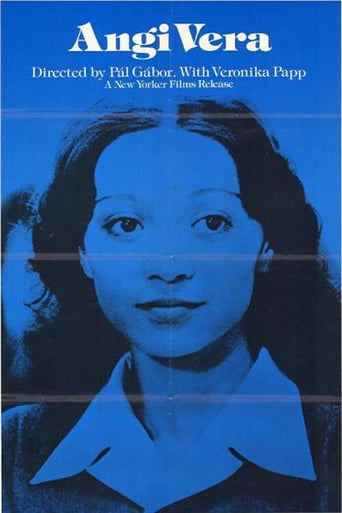

Pál Gábor's "Angi Vera" (spelled Vera Angi when written western style*) tells a story that probably happened more than a few times in real life. The title character (Vera Pap) is a young woman working in a hospital in post-WWII Hungary. When she complains about the unsanitary conditions in the hospital, they send her to a re-education camp. In the camp, she falls in love with another prisoner (Tamás Dunai), while informers ensure that nothing will be pleasant in the camp.The main thing that I derived from "Angi Vera" is how little changed socially in Eastern Europe after WWII. As with the Nazis, the Soviet-backed governments were all about cronyism, resulting in inefficient industry and unsafe working conditions. In a way, it came full-circle into the US: Bush's appointment of a horse trainer as FEMA director -- in addition to moving FEMA to the Department of Homeland Security, thereby turning it into a bureaucratic nightmare -- resulted in Hurricane Katrina destroying New Orleans.Anyway, this is certainly a good movie. It's always important to keep this history alive, especially as cronyism and corruption persist the world over. Also starring Erzsi Pásztor, Éva Szabó, László Halász and László Horváth.*Hungary uses the East Asian name order, in which the family name goes in front. Unlike the East Asian countries, Hungarian names are reversed when written in other countries.
... View MoreAll I can say about Angi Vera is that it has everything one can ask for in a film of this sort: vividly portrayed characters, historical accuracy and moral seriousness.While the nascent Soviet-imposed regime is shown in all of its horror, its characters are shown in full, without simplistic caricature, especially Angi Vera's apparatchik patron, whose background in the resistance to the Nazis just a few years earlier is given full expression. The period details are perfect, right down to the music on the gramophone. The lines spoken by the training school leaders consistently mimic the jargon to perfection: "If you are not going forward, you are going backward," etc., etc.The climactic scene where Angi Vera faces her former lover in one of those infamous self-criticism sessions is a scene that I'll take with me forever---the look on her face when she is reminded of the truth of their relationship, followed by the immediate recognition of the reality of the cross-examination she is undergoing, the hardening of the lines on her face, and the subsequent (and instant) abandonment of her better self---precisely the purpose of the session. All done within a few minutes, but those few minutes capture to perfection the essence of every "People's Democracy" in Eastern and Central Europe. As does the entire film.And the ending---understated but utterly horrifying in its implications. That this film could have been made in Hungary in the late 1970's was one of the surest signs that Communism was soon to be on the way out. I couldn't possibly recommend a movie more strongly than Angi Vera.
... View MoreThis movie shows the transformation of a young, brave rebel into a calculating Party apparatchik in Cold War Hungary. For anyone who views Communism as a tragedy, this is an unforgettable human illustration of how that tragedy happens
... View MorePolitics and love hardly ever mix, but those pesky filmmakers are always exploring it anyway. Angi is torn, typically, between her duty and her emotions. Her choice and her actions are at times surprising, but the film is generally bland, bleak, and maybe even boring. The characters are well developed, though, and to be honest I was interested to see what the end would have to offer.
... View More